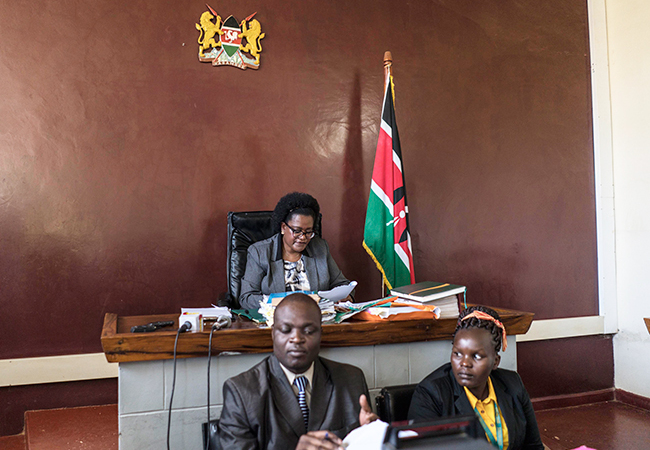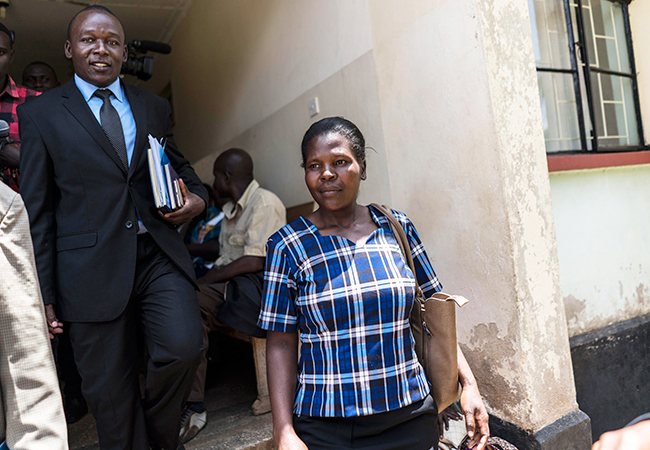Court rules in favour of woman abused during delivery
Majani’s abuse by staff at the Bungoma County Hospital was caught on camera by another patient and received widespread media coverage when it occurred in August 2013
PIC: Josephine Majani (left) at Bungoma High Court in western Kenya. (Credit: Centre for Reproductive Rights)
JUSTICE | HEALTHCARE
KENYA - A woman, who was physically and verbally abused by medical personnel and left to deliver on the hospital floor, recently won a case against the county hospital, its government and the Kenyan cabinet secretary of health.
High Court Judge Justice Abida Ali Aroni ruled that Josephine Majani's human rights were violated under both Kenya's Constitution and international law when she gave birth at Bungoma County Hospital in 2013. Her rights to health and dignity had been infringed upon by way of the physical and verbal abuses she suffered, in a manner that was inexcusable.
Justice Ali Aroni added that the national and county government of Bungoma failed to ensure that healthcare facilities provide quality maternal healthcare services by neglecting to allocate the necessary resources and put in place minimum standards for provision of these services. Bungoma county found in western Kenya is in the Mt Elgon region on the Kenya-Uganda border.
About 8,000 Kenyan women die from pregnancy-related complications each year. According to Kenya's health ministry, deliveries in public health facilities increased from 44% in 2012/13 to the current 70%. Despite this, only 44% of Kenyan women give birth in the presence of skilled health personnel, who are able to address complications.

PIC: Judge Abida Aly Aroni reads the ruling for Josephine Majani. (Courtsey photo)
Evelyne Opondo, a senior regional director for Africa at the Centre for Reproductive Rights, described the case as "a landmark case for Kenyan women." The Centre for Reproductive Rights works across Africa to advance women's access to reproductive healthcare through law and policy reform.
"It sends a very clear message to Kenyan health providers, and to the county and national government authorities responsible for them, that neglect of Kenyan women in healthcare settings will no longer be tolerated — nor will it be without consequences for those responsible," she said.
Centre for Reproductive Rights supported Majani to pursue the case.
Opondo said Majani's experience was not a lapse in judgement or temporary failure to provide an appropriate standard of care.
"It is a systemic culture of institutionalised negligence towards women's health, dignity and human rights, which seems to permeate the country's health services at all levels. It is the duty of the government to ensure that all Kenyan women have access to quality reproductive health services guaranteed by Kenya's own constitution," Opondo said.
Majani's abuse by staff at the Bungoma County Hospital was caught on camera by another patient and received widespread media coverage when it occurred in August 2013.
She was admitted at the hospital for an induced labour. Despite a national directive instructing all public healthcare facilities to offer free maternity healthcare services as of June 1, 2013, Majani had to purchase the medicine necessary to induce her labour. She was not physically checked or monitored by any of the nurses and was informed that if she needed medical attention, she would have to walk from the labour ward to the delivery room herself.

PIC: Josephine Majani leaves court after the ruling. (Courtsey photo)
When intense labour pains started, having called in vain for assistance, Majani walked unaided to the delivery room, where she discovered that all the beds were occupied. While attempting to return to her bed in the labour room, she collapsed and gave birth on the floor. On finding her there unconscious, two nurses repeatedly slapped and verbally abused Majani in anger because she had dirtied the floor when she delivered her baby. Once conscious, she was ordered to walk to the delivery room, still unaided, to be examined. She was released with her baby the following day and suffered severe emotional trauma as a consequence of her treatment at the hands of uncaring staff.
"I was neglected, abused, and shamed during my time at Bungoma district Hospital," Majani said. "I am hopeful that the court's judgement today will force the government to do the right thing and ensure that all women can get the maternal healthcare they need with respect and dignity."